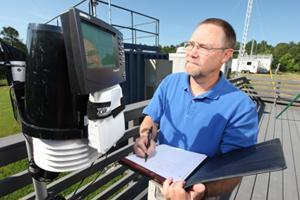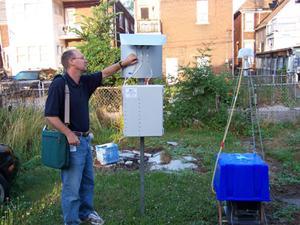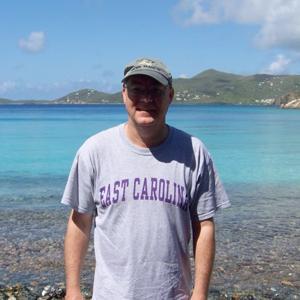Meet EPA Scientist Ron Williams

Air Quality Monitoring in Your Neighborhood
EPA research chemist Ron Williams focuses on evaluating air quality sensors and developing novel monitoring systems for community-based research, such as the Village Green Project (see more below). His efforts involve investigating the human and environmental factors that influence the relationship between the sources of air pollution and how people become exposed to those pollutants. He has extensive international experience and collaborates both within and outside the Agency to fully understand the human health impacts of exposures to air pollution.
When did you first know you wanted to be a scientist?
In the early 1960s, there was a television show called Gilligan’s Island, and the character I most identified with was the professor. He was making coconut radios and figuring out meteorological events and developing new things, all in the hope of getting them off the island. The professor was a role model. Here was a guy on an island without any tools and he was trying to make a difference. I wanted to be the guy who could look at problems and find solutions involving the use of science.
How does your science matter?
My research focuses on air pollution, which is critical for protecting our health. For example, I’m co-leading the Village Green Project, which involves the installation and testing of a solar-powered air monitoring system that measures pollutants in Durham, N.C. The project is giving us an opportunity to evaluate self-sustaining technologies, such as solar power, and wireless capability to report data to websites accessible to the public.
We’re interested to see if the system can collect high-quality data at a lower cost and with less maintenance than current methods. If so, it could be replicated for use by states, communities, and tribes to meet air quality monitoring needs. It’s also an opportunity to advance community awareness and education about environmental air quality. Students and community members will be able to visit the site, see the data and ask themselves, for example, how much does air quality change in the summer versus the fall?

Another part of my work is the evaluation of new types of air sensors to determine their potential use for environmental air quality monitoring. These are typically small, handheld devices, like a smartphone or something similar, that are highly portable and can collect a lot of data on pollutants in the air. Because it’s a new sector, we don’t yet know the ability of these devices to accurately collect environmental data. These sensors have the potential to make a tremendous difference in how citizens, communities, industrial groups, and scientists can collect environmental data.
If you could have dinner with any scientist, past or present, who would you choose and what would you ask them?
Albert Einstein. He was a unique character. Where did his inspiration come from? What was the spark for him that led him to establish the theory of quantum mechanics? What was his “aha moment”?
What do you like most about your research?
It’s fascinating to understand where, how, and to what extent we are exposed to air pollution. It’s not necessarily easy to comprehend, but it’s very important when we think about understanding risk assessment, air quality, and the factors that affect air quality. I also enjoy working with a lot of different groups, both within EPA and outside government. Getting a chance to inform people about our research and how it improves upon air quality is very fulfilling.

Tell us about your background.
I graduated from East Carolina University with a degree in Chemistry. Since then, I've held positions in private industry, academia, and government. During nearly all of that time, I've been involved in environmental research.
If you weren't a scientist, what would you be doing?
Without a doubt, I'd be working for a charitable organization. It's something I already do, but I'd like to expand upon it when I retire. I'd also like to spend more time doing professional writing.
Any advice for students interested in a career in science?
Get experience. Look for every opportunity to gain experience, whether it be a summer job, internship, or volunteering somewhere. I've hired a lot of scientists in my 33 year career and those who have risen to the top have been the ones that were most willing to learn and engage.
